Microbiome Seminar Series
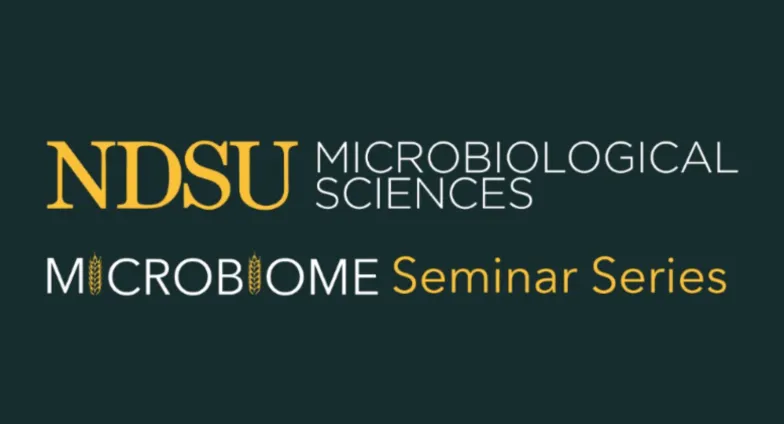
The Microbiological Sciences department hosts a multidisciplinary seminar series around microbiological innovation, issues, and cross-sectoral works. The seminar series are open to NDSU students, faculty, and staff. Some seminars have permission to share and are linked below.
2024 Season
Opposing roles of commensal bacterial mucus degradation and metabolite production in inflammatory bowel disease
Seminar #1: January 22, 2024
Eric Martens, PhD
University of Michigan

Dr. Martens obtained his B.A. (1997) from Washington University in St. Louis and his Ph.D. (2005) from the University of Wisconsin-Madison. He began investigating the mechanisms through which human gut bacteria digest diet and host derived polysaccharaides during his postdoctoral work in the lab of Jeffrey Gordon at Washington University School of Medicine. He continued to pursue this work at the University of Michigan Medical School in 2009 with a focus on members of the Bacteroidetes, one of only a few numerically dominant phyla of human gut bacteria, which are particularly adept at degrading diet and host-derived polysaccharides. Current projects in the Martens laboratory are aimed at understanding the role of commensal gut bacteria in triggering inflammatory bowel disease, the dependency of inflammatory outcomes on th eamount and variety of dietary fiber, and the mechanisms through which bacterial mucin-degrading enzymes digest the mucosal barrier and promote disease. Additional projects in his lab are focused on lateral gene transfer between bacteria in environments like the ocean and those in the gut, bacteriophage interactions with gut bacteria and the immune system, and cultivation and characterization of the unstudied majority of human gut symbionts.
Communication and coevolution between forest trees and their symbiotic fungi
Seminar #2: January 29, 2024

Rytas Vilgalys, PhD
Professor of Biology
Duke University
The Vilgalys lab studies the natural history of fungi, including their genetics, ecology, and evolution. The lab has pioneered many of the molecular-based methods used by other fungal biologists to study fungal diversity. Dr. Vigalys has published over 200 scientific articles with over 28,000 citations. His current research program employs genome sequencing and metagenomics to 1) identify communities of fungi associated with forest trees, including pines, populars, and eucalypts; and 2) investigate molecular functioning of fungal communities with their tree hosts using environmental metagenomics. These studies have broad relevance for understanding the genetics of plant-fungal interactions (symbiosis), microbial ecology of forest ecosystems, and invasive biology of introduced species.
Microbiomes from Theory to Application
Seminar #3: February 12, 2024
Samodha Fernando, PhD
Professor, Nutritional Chemistry
Department of Animal Science
University of Nebraska
Dr. Fernando obtained his BS from the University of Kelaniya, Sri Lanka. He subsequently earned his MS in animal science and reproductive physiology and his PhD in animal nutrition and microbial genomics from Oklahoma State University. He completed a postdoc at MIT before joining the faculty at University of Nebraska in 2011.
His research interests are in understanding microbial structure-function relationships to improve human and animal nutrition. To this end, he is interested in 1) understabding the role of the microbial food chain in methanogenesis and other metabolic disorders in ruminants; 2) developing new animals models to study structure-function relationships in the human microbiome; 3) understanding the influence of host-genotype, gut microbiota and environment toward pathogen colonization in humans and livestock; and 4) uncovering the gut virome in ruminants and non-ruminants.
Are common mycorrhizal networks beneficial for trees in forests? Separating evidence from fantasy in the wood-wide web
Seminar #4: February 26, 2024
Jason Hoeksema, PhD
Professor of Biology
The University of Mississippi
Dr. Hoeksema received his PhD in Ecology from the University of California, Davis in 2002. He held positions as a post-doctoral researcher at the University of California, Santa Cruz from 2002-2006, and as a postdoctoral fellow at the National Evolutionary Synthesis Center at Duke University from 2006-2007, before joining UM in 2007. At UM, he teaches courses in Mycology, Ornithology, Coevolution, Biometry, and Meta-analysis.
Dr. Hoeksema's research focuses on the ecological, evolutionary, and ecosystem consequences of interactions among species, especially involving plants, mycorrhizal fungi, anmd migratory birds.
Managing Microbiomes in Diverse Agroecosystems to Improve Stress Resilience
Seminar #5: March 18, 2024

Laramy Enders, PhD
Assistant Professor
University of Purdue
Dr. Enders is an applied evolutionary biologist who studies plant-insect interactions in agroecosystems. She received her PhD from the University of California - Riverside, where she studied stress biology and population genetics in Drosophila. She worked as a postdoctoral researcher at the University of Nebraska-Lincoln and Kansas State University, where she focused on uncovering the molecular mechanisms responsible for virulence of aphid pests in soybean and wheat. In 2017, she joined Purdue University's Entomology Department, where she expanded her research interests to include both plant and insect microbiomes. Dr. Enders' research program employs a systems-level approach to investigate relationships between insect herbivores, host plants, and their microbial partners. The goals of her program are to improve our understanding of the ecological factors driving microbiome assembly in agricultural environments and apply this knowledge to improve crop health and pest management.
Seminar #6: March 25, 2024
Zakee Sabree, PhD
Associate Professor
The Ohio State University
This seminar was canceled.
Bacteria social behavior: cooperation, conflict, and the evolution of quorum sensing
Seminar #7: April 8, 2024

Josie Chandler, PhD
Associate Professor
University of Kansas
Dr. Chandler's research is focues on bacterial social behaviors such as communication (e.g., quorum sensing), cooperation, and competition. Social behaviors shape the function and behavior of microbial communities and are relevant to infections, natural ecosystems, and synthetic microbial systems. She studies social interactions in several species of Proteobacteria, including Burkholderia pseudomallei, the causative agent of melioidosis, and Pseudomonas aeruginosa, an opportunistic pathogen and the most common cause of fatality in patients with the genetic disease cystic fibrosis. The lab uses laboratory coculture models, genetics, genomics, microbiology, and biochemistry to understand the role of social behavior in complex microbial communities. Dr. Chandler co-leads the NIH Bridges to Baccalaureate diversity-enhancing training program, is a track leader for the American Society of Microbiology Microbe meeting, and a steering committee member of the NIH COBRE Cellular and Molecular Analysis of Disease Pathways program at KU. Her lab is funded primarily by the NIH and she has also received funding from the NSF and the Cystic Fibrosis Foundation.
FUTURE SEMINARS...
Extracting the needles in the haystack: unbiased detection of eukaryotes from metagenomes
Seminar #8: April 22, 2024
Matt Anderson, PhD
Associate Professor
University of Wisconsin
Matt Anderson, PhD is an Associate Professor in the Dept. of Medical Genetics in the Laboratory of Genetics at the University of Wisconsin - Madison.
His work centers on the role of genetic and cellular diversity in complex systems with a specific focus on microbial eukaryotes. Much of this work is performed in partnership with Tribal Nations to address questions of interest in the community.
Past Seminars...
2023 Season
Functional mapping to translate between mouse and human microbiota research
2023 Seminar #9: May 9, 2023

Virginia Pedicord, PhD
Group Leader - Sir Henry Dale Fellow
Cambridge Institue of Therapeutic Immunology & Infectious Disease (CITIID)
University of Cambridge
Dr. Pedicord received her Ph.D. in Immunology and Microbial Pathogenesis from Cornell University under the supervision of Dr. James P. Allison at Memorial Sloan Kettering Cancer Center. There she studies how CD*+ T cell survival, differentiation, and function in vivo are shaped by activation in the contexts of IL-10 inhibition, immune checkpoint blockade, and manipulation. She completed her postdoctoral training at Rockefeller
University, where she began investigating the role of the gut microbiota in T cell-mediated immunity and intestinal barrier function, before joining the University of Cambridge Department of Medicine and Cambridge Institute of Therapeutic Immunology & Infectious Disease in 2018.
Her research group studies how interactions with gut microbes and microbial metabolites affect resistance to infection, local and systemic T cell responses, and the gut-brain axis of neuronal function.
Understanding environmental microbiomes for plant and planetary health
2023 Seminar #8: April 25, 2023
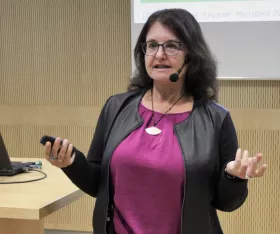
Dr. Gabriele Berg
Graz University of Technology (TU Graz), Graz, AUSTRIA
Dr. Berg studied biology, ecology, and biotechnology at the universities in Rostock and Greifswald and obtained her Ph.D. in 1995 in microbiology from Rostock University (Germany). In 2005 she became a full professor in environmental biotechnology at Graz University of Technology (Austria), and in 2021 she added a professorship in Potsdam (Germany).
Dr. Berg's interests are focused on microbiome research and the translation of the results into new biotechnological and microbiome management concepts for health issues.
From 2018 to 2020, she was listed as one of the most influential researchers worldwide (top 1, Clarivate Analytics) and received numerous awards, e.g., the Knight's Cross for Research Styria (2022).
Watch the recording
Is the microbiome the answer to all of life's little (and big) questions?
2023 Seminar #7: April 11, 2023
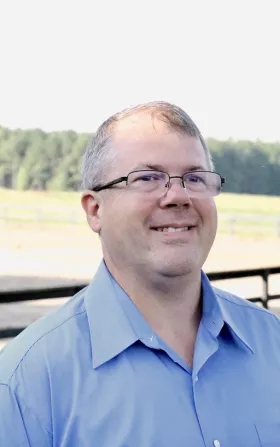
Todd R. Callaway, PhD
Associate Professor
Department of Animal and Dairy Science
University of Georgia
Dr. Callaway is a ruminant microbiologist who received his B.S. and M.S. degrees from the University of Georgia in Animal and Dairy Science. He completed his Ph.D. degree in Microbiology at Cornell University. Dr. Callaway joined the USDA-ARS and served as a research microbiologist in the Food and Feed Safety Research Unit in College Station, Texas. He became National Program Leader for Food Safety for USDA-ARS, with a research portfolio that included On-Farm Food Safety, Antimicrobial Resistance, and Microbiome Exploration. Dr. Callaway has published over 240 refereed journal articles, 25 book chapters, and two books. He received the American Society of Animal Science Early Careers Research Award and the USDA-ARS Early Career Research Awards. His research focuses on the role of the gut microbiota in cattle nutrition and how the complex environment of the cattle gastrointestinal tract can impact food safety and production efficiency. He has led research on improving digestibility and altering end products from microbial fermentations, including impacts on methane, ammonia, VFA, and DMD/NDF digestibility.
Watch the recording
Liver Abscesses in Feedlot Cattle: A Deep Dive!
2023 Seminar #6: March 28, 2023
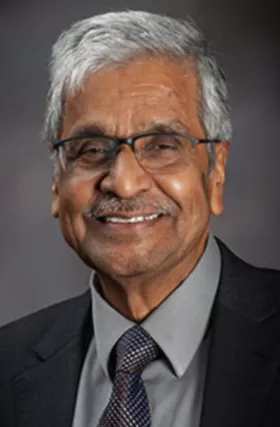
T. G. Nagaraja, BVSc, MVSc, PhD
Kansas State University
Dr. Nagaraja's expertise is in the gut microbiology of cattle, particularly beef cattle. His program, a blend of basic and applied research, has focused primarily on the role of ruminal microbes in the function and dysfunctions of the rumen of cattle and on food-borne pathogens, particularly Shiga toxin-producing Escherichia coli and Salmonella in cattle. Specifically, the contributions that he and his associates have made are in the following areas: antibiotics, particularly ionophores and ruminal fermentation modifications; etiology and pathogenesis of and vaccine development for liver abscesses; causes and preventions of ruminal acidosis and bloat; ecology of Shiga toxin-producing E. coli and Salmonella in cattle; and antimicrobial resistance and antimicrobial alternatives in cattle production systems.
He has mentored 21 Ph.D., 22 MS, 4 MPH students, several post-docs, and visiting scientists. His research has resulted in 8 patents, 252 peer-reviewed journal articles, 16 review papers, 27 book chapters, and a compendium on rumen health.
Mechanistic mining of the gut microbiota for metabolic and mental health
2023 Seminar #5: March 14, 2023
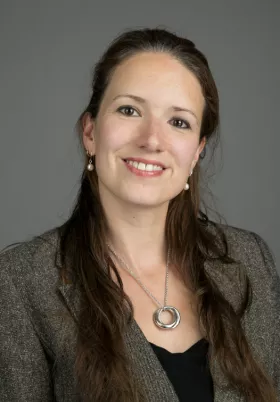
Harriet Schellekens, PhD
Department of Anatomy and Neuroscience University College Cork, Ireland
Dr. Schellekens is a lecturer at the Department of Anatomy and Neuroscience, a principal investigator with Food for Health Ireland, and a funded investigator at APC Microbiome Ireland at University College Cork - Cork, Ireland.
Her group investigates the impact of diet and nutrition and the gut microbiome on human health and physiology, particularly in the context of obesity and stress-related disorders. She uses mechanistic and translational studies bridging basic and clinical aspects of neuroscience and nutrition to investigate the link between metabolic disease and mental health and the potential amelioration of both via microbiome-targeted approaches. Her lab investigates the bi-directional communication mechanism between brain and gut microbiota, including immune and neuroendocrine pathways, G-Protein Coupled Receptors, and signaling via microbiota-derived metabolites.
The Earth Microbiome Project - Using standardized Multi-omics to understand microbial taxonomic and functional diversity at scale
2023 Seminar #4: February 28, 2023

Justin Shaffer, PhD
University of California at San Diego
Dr. Shaffer is a plant and microbial ecologist with a strong background in mycology. He obtained his B.A. from the University of California, Santa Cruz in 2009, and his Ph.D. from the University of Arizona in 2017. He began working as a postdoc with the Knight lab in 2018.
Dr. Shaffer's research is focused on elucidating how dynamics in microbial communities contribute to emergent ecosystem function or host fitness. He is involved in many projects but is currently the project lead of the Earth Microbiome Project. He is also involved in science education and seeks to improve education in biology by fostering inclusive environments and using active learning methods.
Watch the recording
Steps Towards Microbiome-assisted Barley Breeding
2023 Seminar #3: February 14, 2023
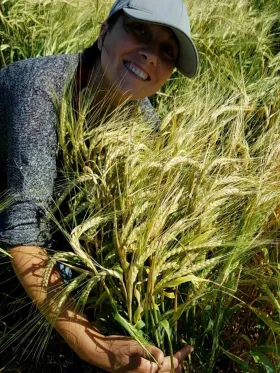
Ana Badea, PhD
Research Scientist
Agriculture and Agri-Food Canada
Dr. Badea is a research scientist in barley breeding and genetics at the Agriculture and Agri-Food Canada (AAFC) Brandon Research and Development Centre (BRDC) in Manitoba, Canada. She has been part of AAFC since 2004, beginning as a postdoctoral visiting fellow at Lethbridge, Alberta. Dr. Badea moved to the BRDC in 2012 as a barley breeder for the Six Row and Hullness Barley Breeding Program. Beginning in 2017, she wsa entrusted witht he alrgest AAFC barley breeding program, the Two-Row Barley Breeding Program, which she continues to lead.
Dr. Badea is on the board of the Prairie Grain Development Committee (PGDC), the Canadian Malting Barley Technical Centre (CMBTC) and Plant Breeders' Rights (PBR) Advisory Committee. She is also an Adjunct Professor with the Faculty of Agricultural and Food Sciences at the University of Manitoba and an Associate Editor for two journals.
Watch the recording
Taming the First Methanogens from Outside the Euryarchaeota
2023 Seminar #2: January 30, 2023

Roland Hatzenpichler, PhD
Assistant Professor
Montana State University
Dr. Hatzenpichler, a first-generation college student, earned his MS (2006) and PhD (2011) in microbial ecology in the lab of Michael Wagner at the University of Vienna (Austria). He was a postdoc with Victoria Orphan at Caltech from 2011 to 2016 and he has been an Assistant Professor in MSU's Department of Chemistry and Biochemistry since 2016. Dr. Hatzenpichler has raised $5.2M in direct funding for his lab and more than $17M in total funding since 2017. He was an elected member of the Junior Advisory Group of the American Society for Microbiology from 2014 to 2017, and he was named a NASA Early Career Fellow in 2017. He is a member of the Steering Committee of NASA's Network for Life Detection (NFold), the User Executive Committee of the Department of Energy's Joint Genome Institute (JGI), the Factuly Committee for MSU's Molecular BioSciences Program, and the Early Career Faculty Advisory Panel of MSU's Center for Biofilm Engineering. He is an editorial board member of the ISME Journal and Environmental Microbiology.
Influence of the Maternal Microbiome on Offspring Neurodevelopment and Behavior
2023 Seminar #1: January 17, 2023

Aaron Ericsson, DVM, PhD
Assistant Professor
Missouri University College of Veterinary Medicine
Dr. Ericsson's lab is focused on the role of host-associated microbiomes in human and animal health. He recieved his DVM in 2006, completed a residency in Comparative Medicine in 2009, and obtained a PhD in Pathobiology in 2013. He serves as Director of the MU Metagenomics Center (MUMC), Project Lead for microbiome research for the NIH U42-funded MU Mutant Mouse Resource and Research Center (MMRRC), and co-investigator on several R01-level awards. His research has investigated the influence of select microbes and microbial communities on susceptibility to colorectal cancer (K01-funded); the influence of maternal and neonatal gut bacteria on the development of the immune and central nervous systems; susceptibility to conditions associated with abnormal neurodevelopment and the development of anxiety-related behavior (R03-funded); and the passage of maternal microbiota to offspring. He has broad expertise in associations between host-associated microbiomes on health and disease in rodent models, experimental manipulation of the microbiome, assessment of microbial compositions and function using metagenomic and metabolomic platforms, and analysis of microbiome-associated data using the most current and appropriate methods.
